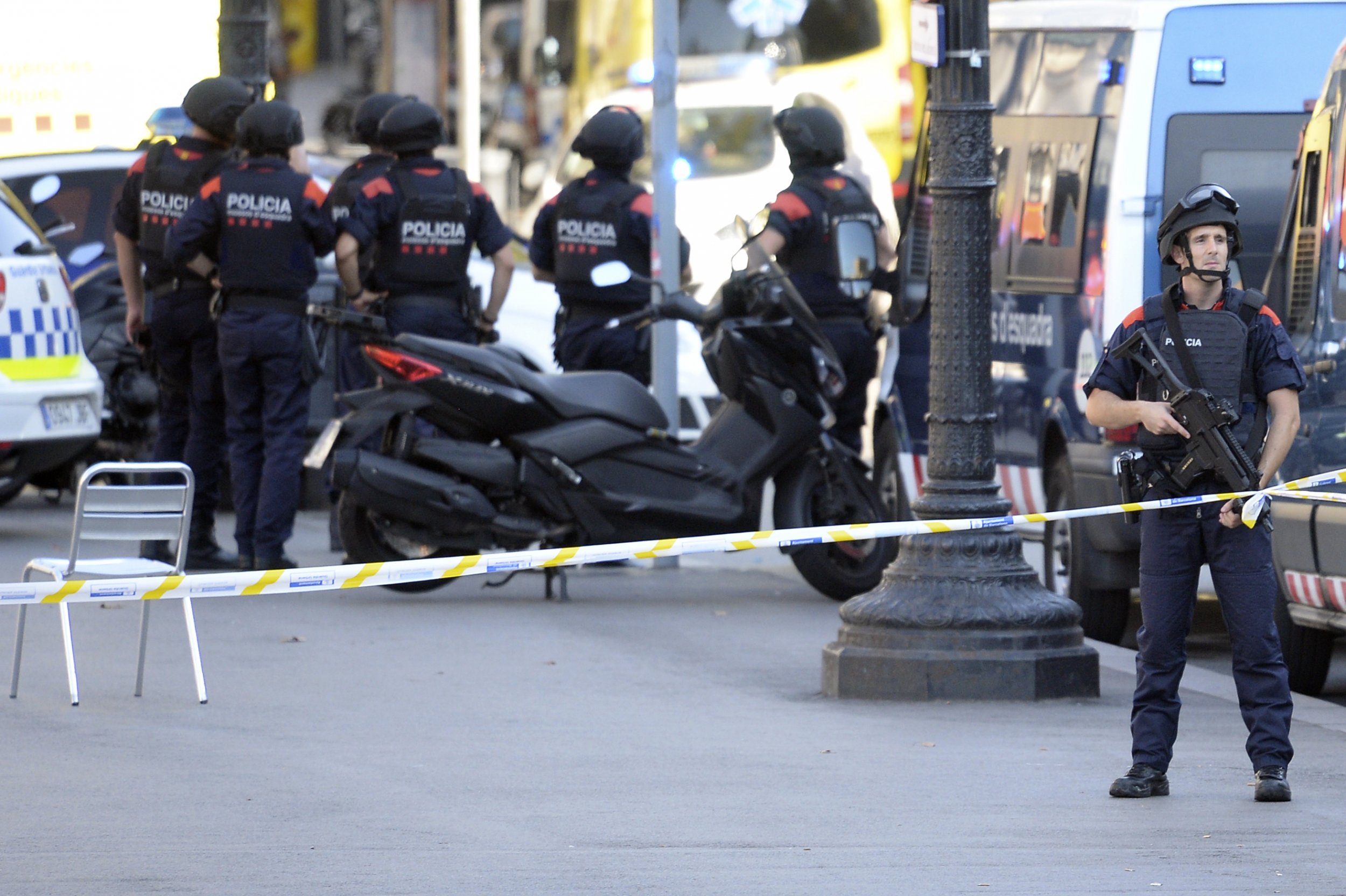
The CIA warned Barcelona authorities in May that the famous Las Ramblas street in the northern Spanish city could be a target for an extremist attack, according to reports in the Spanish media.
On Thursday a van plowed into civilians in Barcelona's center, killing 13 people and injuring scores. Police have arrested two people, Spanish and Moroccan nationals, but are still searching for the driver of the van. Authorities have also said police shot dead five suspects in a later incident in the nearby seaside resort of Cabrils.
The Islamic State militant group (ISIS) claimed responsibility for the Las Ramblas attack on its Amaq news agency, saying it was the work of its "soldiers." The vehicle-ramming, which left a bloody scene of carnage on the strip that is popular with tourists, represents the first ISIS-claimed attack on Spanish soil.
"The executors of the Barcelona attack were soldiers of the Islamic State," Amaq agency said Thursday night, as quoted by U.S.-based jihadi monitoring platform SITE Intelligence.
But U.S. intelligence told the Mossos d'Esquadra regional police in May that radical Islamists could target the street, which has a wide pedestrianized in the center, with cars able to drive down either side, Spanish daily newspaper El Periodico reported.
After vehicle attacks in Nice, Berlin and several in London, the CIA in June warned Catalan police in a notice that Las Ramblas was at risk.
ISIS has threatened Spain with attacks because of its membership of the anti-ISIS coalition led by the United States, currently bombing the group's positions in Iraq and Syria. The jihadi group also seeks to reimpose Islam in previously Muslim-ruled areas of the world—Spain and Portugal were formerly known as Al-Andalus, a region ruled by Muslim caliphs in the medieval period.
ISIS fighters have issued several threats toward Spain on social media since 2014, and the group has set up Spanish language channels on the messaging services it uses to pump out its propaganda. After Thursday's attack, it shared a Spanish language statement to claim responsibility on its Amaq news agency.
The driver, who remains unidentified, was able to mount the sidewalk on Thursday, zigzagging down the pedestrian boulevard and killing more than a dozen people of at least 18 nationalities in the heart of Spain's second city.
Hours later, police shot dead five suspected attackers wearing fake suicide vests in the town of Cambrils, a quiet seaside resort 70 miles south of Barcelona.
They had driven a car—an Audi A3—into pedestrians, injuring seven people including one police officer, before engaging in a shootout with local police. A woman hit in the attack died of her injuries on Friday, according to emergency services, taking the total death toll in the two attacks to 14. Authorities detonated the fake suicide vests in controlled explosions. Catalan police said they believed the incident to be linked to the earlier van attack.
Spanish Prime Minister Mariano Rajoy said the vehicle-ramming was the result of "jihadist terrorism," despite the driver remaining at large.
"Today the fight against terrorism is the principal priority for free and open societies like ours. It is a global threat and the response has to be global," Rajoy told a news conference Thursday.
The ramming would be the first radical Islamist attack in Spain for over a decade. In 2004, an Al-Qaeda-inspired cell targeted Madrid's commuter train system with a series of coordinated bomb blasts, killing 192 people. It remains the deadliest extremist attack in Europe since the 1980s.
Regional police said that a blast at a house 200 kilometers south of Barcelona on Wednesday had connections to the vehicle-ramming. They said they suspected those inside the house were "preparing an explosive device."
But ISIS's claim did not indicate a direct involvement of the jihadi group, and the theory of the participants being inspired, rather than directed, remains a strong possibility.
Police killed five suspects early Friday morning in an operation in the seaside resort town of Cambrils, south of Barcelona, that the regional Catalan government said was connected to the Barcelona attack. They said the suspects were carrying belts that a police bomb squad detonated.
Security experts say that authorities can take action, such as installing bollards, to minimize the damage of vehicle attacks. But they have warned that the threat must be stopped at the stage of radicalization, as vehicle attacks are easy to conduct and tough for security services to detect before time.
Plowing a vehicle into civilians only requires the ownership or rental of a car or van, and little skill to carry out the assault.
Popular pedestrian areas have become targets of such attacks since 2016, including the Promenade des Anglais in Nice, and Westminster Bridge and London Bridge in Britain.
Uncommon Knowledge
Newsweek is committed to challenging conventional wisdom and finding connections in the search for common ground.
Newsweek is committed to challenging conventional wisdom and finding connections in the search for common ground.
About the writer
Jack is International Security and Terrorism Correspondent for Newsweek.
Email: j.moore@newsweek.com
Encrypted email: jfxm@protonmail.com
Available on Whatsapp, Signal, Wickr, Telegram, Viber.
Twitter: @JFXM
Instagram: Read more
To read how Newsweek uses AI as a newsroom tool, Click here.








